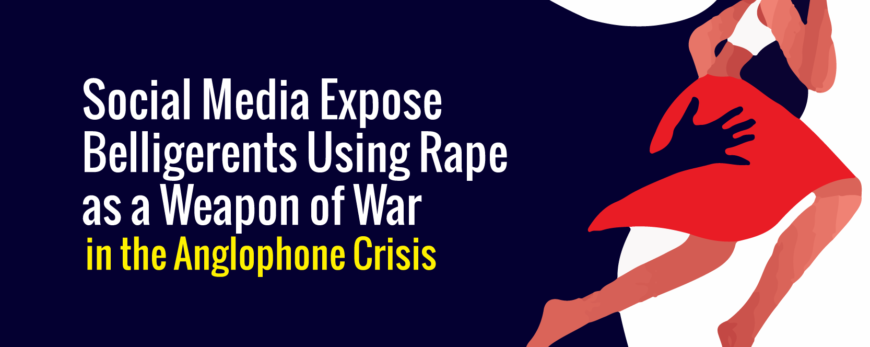Social Media Expose Belligerents Using Rape as a Weapon of War in the Anglophone Crisis
The Anglophone crisis that started as a peaceful protest later became a bloody war with killings and burning down of houses by both separatist fighters and the forces of law and order, forcing many to flee to safer places within and out of Cameroon. Women and girls have been more affected by the crisis, and the recent wave has seen the fighting parties using rape as a weapon of war. Cases of sexual abuse have been reported with accusing fingers pointing at either of the camps. Social media has played a role in exposing the belligerents.
Since the beginning of the Anglophone crisis in Cameroon in 2016, separatist fighters have clashed with government forces following claims that Francophones have marginalized the 20% Anglophones who make up the country’s population. In its fourth year, the two English speaking regions recordsome 450,000 persons internally displaced, and 204,000 returnees.
According to OCHA Cameroon, approximately 52% of the displaced are women, with children representing 44.5% of the IDP population (96,472 girls and 95,031 boys). Women are said by right groups to bare the highest grunt of the crisis as rape is now being used as a weapon.
Cases of sexual abuse are reported in Cameroon in their numbers, but a spike has been recorded amid the Anglophone crisis. The constant gunshots have made many women and girls vulnerable to sexual abuse with some forced to flee into the bushes for safety.
Separatist fighters, government forces and individuals are guilty of sexual abuse on women and girls in both regions. Some of the perpetrators were brought to court and sanctioned while others have never paid for their crime.
With the injustices levied on many victims by the government, Cameroonians are using social media as a tool to call for justice in such awful attacks on women and girls. Social media influencers, CSOs and human rights groups use their social media platforms to fight the acts of rape in Cameroon.
As of July 31 2020, Northwest and Southwest Regions, OCHA revealed that it had recorded 73 cases of rape, with only 13 victims being able to obtain health-care services due to the absence of services in their localities.
On July 23, 2018, a video circulated on social media of a 17-year-old girl explaining how a military officer participating in mix patrol to provide safety to civilians, raped her at a filling station in Bamenda on a “Ghost town” Monday because she didn’t have an ID card. The video that went viral sparked numerous condemnations, which later caused the government to sanction the perpetrator. https://youtu.be/4XED3Xe4CUo
In a video posted on YouTube on May 11, 2018, by Mimi Mefo Info, an IDP in Bamenda confirms girls’ raping in her village by the military. The military, however, still denies committing such acts in the NW/SW regions of Cameroon.

On July 22 2019, Human Rights Watch released a report https://www.hrw.org/news/2019/07/22/cameroon-security-forces-kill-civilians-rape-woman
that circulated on different social media platforms, indicated that Cameroon security forces raped a woman in Kumbo, Bui Division of the North West Region. The soldiers reportedly stole her money after raping her at gunpoint.
In 2019, a case of a 17-year-old girl in Nkambe circulated online. She was reportedly raped by while hiding in her mother’s farm. She luckily found her way out of Nkambe to Yaounde.
On November 18 2019, Dr Sangwe Clovis raised an alert on social media of a 19-year-old IDP in Douala, originally from KwaKwa in the South West Region who was raped daily by a cleaner of a hotel who locked her up in the janitor’s room at the hotel, after promising to help her. An administrator of the hotel found her. She became pregnant with twins. Through social media, Dr Sangwe Clovis mobilized financial and material support to help her and the babies. https://m.facebook.com/story.php?story_fbid=919819711555362&id=443277135876291
In a video published on the BBC News Pidgin’s Facebook page on July 17 2020 https://www.bbc.com/pidgin/tori-53089309, a 19-year-old girl narrates how she was gang-raped in her village in the South West Region while running from gunshots. She later found out she was pregnant.
Women and girls are the most vulnerable persons in the armed conflict devastating the two English speaking regions. Separatist fighters, military officers, and individuals abuse this group of persons to show theirpower and satisfy their sexual desires in crisis.
Rape has led to numerous unwanted pregnancies and crude abortions. https://www.voanews.com/africa/study-abortions-rapes-rise-cameroons-conflict-zones
Rape has increased the psychological trauma of the victims.
It has also damaged many of these young girls’ dreams and has left them at the mercy of others to take care of them and their babies.
Though social media advocacy against rape by international and national agencies and individuals yields little fruits, pint-sizedefforts have been made on the ground to protect women and girls from such perpetrators.
To ensure women and young girls’ safety, the belligerents have to respect the rules of engagement and stop using women as weapons of war. A channel must be created for victims of sexual abuse to report the perpetrators for justice to prevail or sanctions given accordingly. It shouldn’t end with the exposure victims recounting their experiences on social media,but follow-up should be done to punish the rapist. Social media needs more rigorous campaigns against belligerents using rape as a weapon of war.
Reference links
https://www.hrw.org/news/2019/07/22/cameroon-security-forces-kill-civilians-rape-woman
https://www.bbc.com/pidgin/tori-53089309
https://www.bbc.com/pidgin/tori-53089309
https://m.facebook.com/story.php?story_fbid=919819711555362&id=443277135876291
https://www.voanews.com/africa/study-abortions-rapes-rise-cameroons-conflict-zones
https://www.thebalancesmb.com/what-is-social-media-2890301
Article by: Rosaline A Obah

